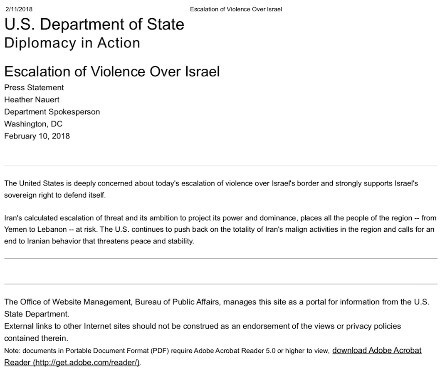Readers of the blog will know that I occasionally take the time to comment on significant events in Israel and in U.S.-Israel relations, two subjects that I am passionate about. For example, please see my posts praising President Donald Trump’s decision to recognize Jerusalem as the capital of Israel [see blog] and on the 50th anniversary of the liberation of Jerusalem [see blog].
On February 9, 2018, the Israeli military intercepted an Iranian drone in Israeli airspace. In response, the Israeli Air Force struck the Iranian base in Syria from whence the drone had been dispatched. After an Israeli F-16 took damage in the raid, the Israeli military responded by striking twelve Syrian and Iranian positions in Syria.
While the United States has always been Israel’s most significant international backer, its statements in support of Israel’s right to defend itself from attacks foreign or domestic have often been equivocal. Generations of Americans are have been accustomed to hearing pleas from the United States and others for calm on “both sides” whenever there is violence involving Israel, regardless of the initial aggressor or cause of the violence.. This language was not employed only with regard to Israel’s foreign wars, but also to its handling of domestic terror within its own borders.
With the history of U.S.-Israeli relations in mind, I was pleasantly surprised to see an unequivocal statement of support for Israel’s position from the U.S. Department of State (DOS), which has seldom been the U.S. agency most predisposed to stand with Israel. Furthermore, Secretary of Defense James Mattis also released a clear statement of support for the Israeli position. First, let us examine the DOS statement:
[Click image to view full size]
There are three things that make this statement refreshing.
First, DOS unequivocally supported “Israel’s sovereign right to defend itself.” That this is even noteworthy represents a peculiarity in the history of U.S.-Israel relations. There can be little doubt that the United States government would never mince words in supporting the sovereign right of one of its European allies to defend itself from an incursion of its airspace by an enemy regime. President Trump’s recognition of Jerusalem as the capital of Israel normalized how the United States treats its steadfast ally in recognizing its sovereign right to choose its own capital. Here, DOS made clear that Israel has the sovereign right equal to that of any other nation to defend itself from attack.
Second, DOS minced no words about the party responsible for the escalation of violence. Iran, flush with U.S. and European cash from the so-called nuclear deal and eager to project its power abroad, is indeed the chief destabilizing actor in the Middle East. Iran has propped up the brutal Assad regime in Syria, fueled sectarian conflict in Yemen, aided Hezbollah in asserting its control over Lebanon, employed militias to increase its grip on Iraq, threatened Arab states in the Gulf, and acted as the leading sponsor of terrorist organizations in the region. With this in mind, it is entirely proper that the United States not only recognizes Israel’s sovereign right to defend itself, but that the administration also publicly recognizes that the responsibility for the violence lays squarely with the theocratic regime in Tehran.
Third, the Jerusalem Post reported remarks by Defense Secretary Mattis on the Israeli response to Iranian aggression.1 Mattis stated that “Israel has an absolute right to defend itself, and I think that’s what happened yesterday.” In recognizing Israel’s absolute right to defend itself, Secretary Mattis distinguished the U.S. position from others — such as many European states and the United Nations — which often take the position that Israel must temper actions it takes in its own defense in light of political contingencies in the region. Here, Mattis recognized that Israel’s right to self-defense is inviolable.
After noting that Iran was responsible for the violence, Mattis added another important point regarding the Israeli response: “They don’t have to wait until their citizens are dying under attack before they actually address the issue.” Traditional modes of thinking about Israel in the domestic and foreign policy establishments have a tendency to view everything through a geopolitical lens. In fact, Mattis himself has not always been immune to this way of thinking. In 2013, Mattis echoed former President Jimmy Carter and former Secretary of State John Kerry when he warned that, by failing to reach a comprehensive peace agreement with the Palestinians, Israel risked becoming an “apartheid” state.2 However, in his current statement, Secretary Mattis recognized that the lives of the citizens of Israel are at stake. The failure to respond to threats pr acts of violence in order to appease the sensibilities of the international community and some of those in the foreign policy establishment may lead to the otherwise avoidable deaths of Israeli citizens. This is why it was notable to see Mattis make clear that Israel not only has the “absolute right to defend itself,” but also that the exercise of this right can make a life or death difference for people going about their daily lives.
It has been refreshing to see the Trump Administration bring much needed fresh thinking to the United States’ relationship with Israel and to the issues presented by the Middle East at large. The foreign policy establishment had been in dire need of such an overhaul for decades. To be sure, there are still many serious questions regarding the Administration’s overall posture in the Middle East, and it remains to be seen how it will respond to the brazen aggression from Iran going forward. However, the statements from the DOS and from Secretary Mattis combined with the unabashedly pro-Israel policy decisions from the White House appear to be a sign of a new level of American support for Israel’s right to defend its sovereignty and its people going forward.
- Gold, Avraham. “Mattis: Israel has an Absolute Right to Defend Themselves.” The Jerusalem Post. Feb. 12, 2018. http://www.jpost.com/Israel-News/Mattis-Israel-has-an-absolute-right-to-defend-themselves-542392
- Kampeas, Ron. “Mattis said Israel can be a pain but few in pro-Israel camp seem to care. Why?” The Times of Israel. Dec. 7, 2016. https://www.timesofisrael.com/mattis-said-israel-can-be-a-pain-but-few-in-pro-israel-camp-seem-to-care-why/






